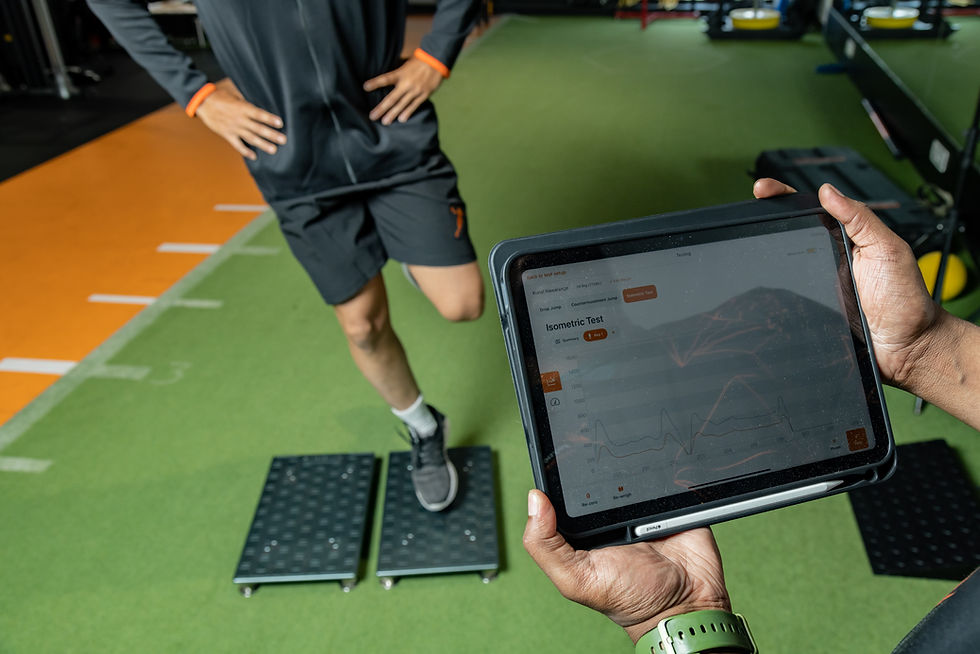FUNDAMENTAL MOTOR SKILLS - LET THE YOUNGER ONES GET SPORTY !
- Team PhysioQinesis : Credit Pranay Maru
- Aug 23, 2024
- 3 min read
Updated: Feb 7, 2025

Introduction
In the upcoming GenZ, there has been a subtle decline in Fundamental Motor Skills due to increased screen time, reduced outdoor play and early specialisation in a particular sport, hindering the evolution of the Fundamental movement skills. Motor Skills are a category of actions that have an intention or outcome and could be sport-specific; what makes them fundamental is “ the uniqueness of the movement pattern”, “Near universality of the motor task performed”, and “Generalization to more complex skills.”
These fundamental motor skills are categorized into Locomotion, Postural and Object Control Skills. The PhysioQinesis Performance Lab understands the upcoming concern and encourages all individuals to promote the importance of fundamental motor skills and promote the multisport intervention for the younger ones.
The movements that comprise the fundamental motor skills are catch, run, leap, vertical jump, overhand throw, ball bounce, kick, dodge, punt, forehand strike, and double-hand side arm strike. All these skills are used. Focusing on the benefits of working on the Fundamental Motor Skills for Youth Development Enhances Sports Performance, Injury Prevention, Skill Transferability and Long Term Athlete development - where it helps the younger ones to have a longer career or allow them to play several sports for a long term.

To overcome the decline in Fundamental Motor Skills, we should encourage:
Free Play: Let the younger ones play freely and build their motor skills naturally.
Variety of Activities: Ensure the children are exposed to various physical activities to develop skills. Hence, multi-sport participation at a younger age is considered beneficial because the child is exposed to several skills, making it easier to adapt to any sport.
Progressive Challenges: For any skills performed by the child, ensure that the skills are challenged slowly and progressively so that the child is engaged for a more extended period and does not lose hope while unable to perform a more challenging skill.
Positive Reinforcement: Ensure the child has moral support from their surroundings so that they enjoy the process and is confident enough to perform the particular skill.
Role of Strength and Conditioning in the Development of Fundamental Motor Skills :
1. Movement Assessment and Correction:
a. Weakness identification: S&C coaches are skilled at evaluating movement patterns. They can identify specific regions where a person has trouble with basic motions.
b. Correcting incorrect form: They can assist people in gaining appropriate technique and efficiency in fundamental motions by offering feedback and remedial activities.
2. Development of the Physical Attributes and Performance Enhancement:
a. Increasing power and strength: Although strength training is frequently linked to older athletes, it is crucial for developing FMS. Strength, power, and endurance are all necessary for learning basic motions, and S&C coaches may create programs to help with these aspects.
b. Improving mobility and flexibility: Effective movement requires both of these qualities. S&C trainers can incorporate exercises that increase the range of motion and joint health.
3. Creating Movement Challenges:
a. Developing skills: S&C coaches can create drills and activities that push participants to improve their FMS. They can assist people in learning more intricate movement patterns by progressively raising the difficulty level.
b. Developing neuromuscular control: S&C coaches can help people become more skilled at controlling their bodies in space by implementing activities emphasizing balance, coordination, and agility.

4. Injury Prevention:
a. Developing resilience: S&C coaches may aid in lowering the likelihood of injuries by encouraging the development of strength, flexibility, and stability.
b. Adjusting movement patterns: Resolving compensations in movements might help avoid overuse injuries and enhance performance in general.
5. Long Term Athletic Development:
a. Laying the groundwork: S&C coaches may assist athletes in creating a solid basis for their future sports specialization by emphasizing FMS development.
b. Realizing potential: Athletes can better manage the demands of their chosen sport when they have a strong foundation in FMS.
Conclusion:
By strongly emphasising FMS in youth development, we can produce a new generation of athletes who are prepared for success. It's time to change the emphasis from early specialisation to developing a solid foundation of basic movement abilities. We are investing in the future of sports when we invest in FMS.




Comments